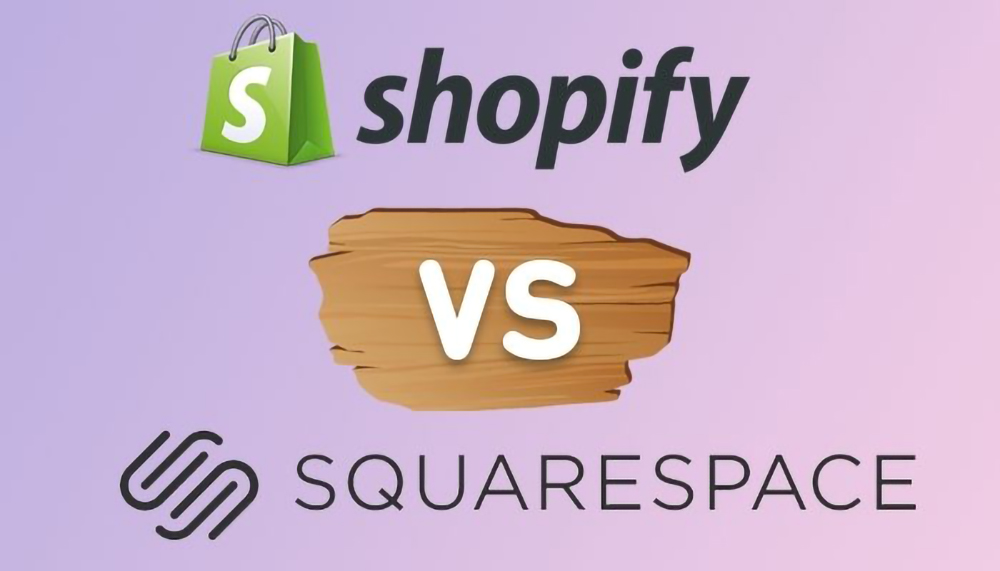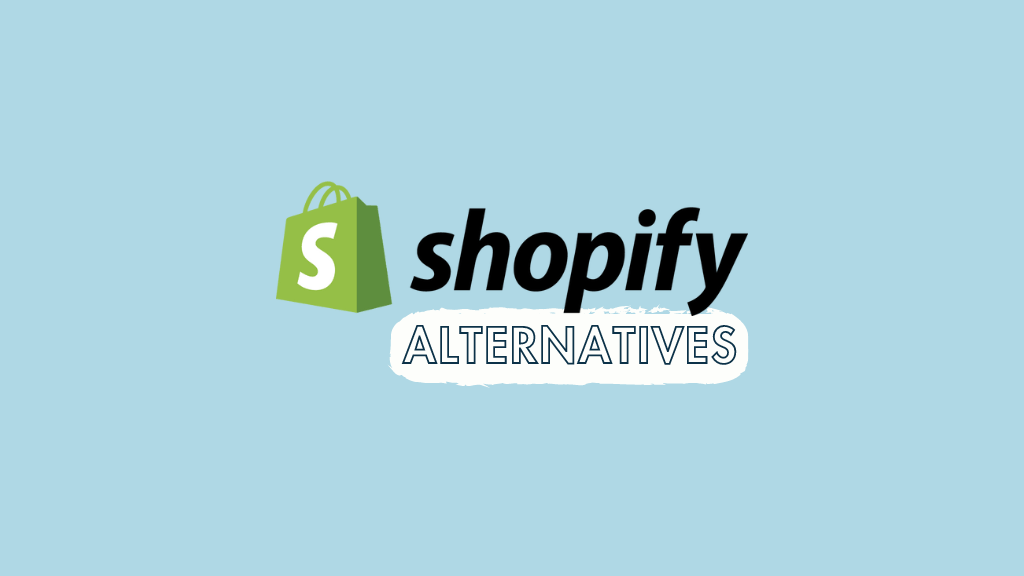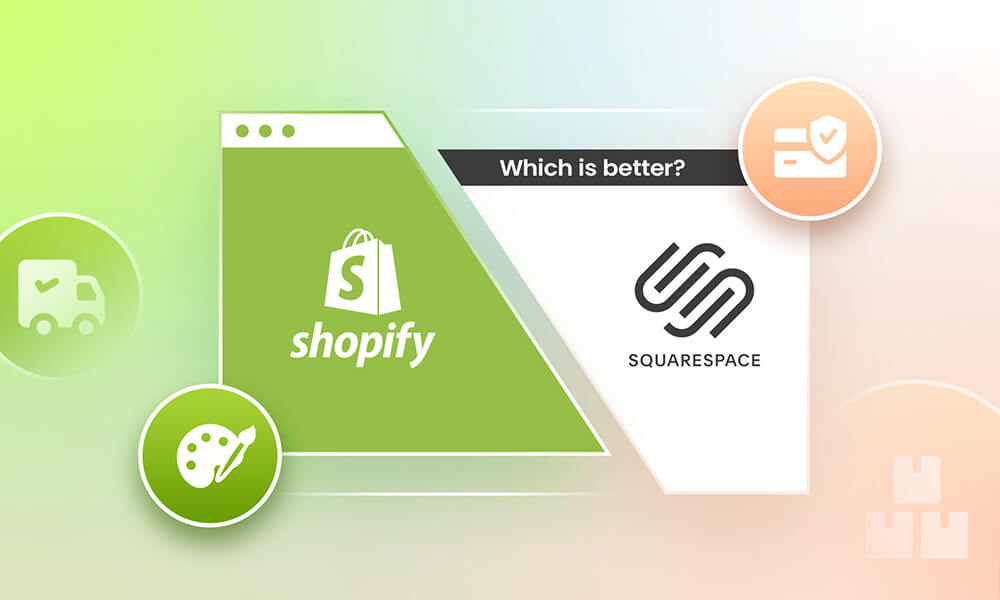
best ecommerce platform
Choosing the right e-commerce platform is crucial to the success of your business. Today, we’re looking at two market giants: What is better Shopify...
E-commerce is an effervescent sphere that attracts as many new players as interested. However, the latter's web aspect can be a brake for many. E-commerce platforms are the tools used to build online stores. There are many of them and offer different features, the choice of the platform can then be difficult for a neophyte.
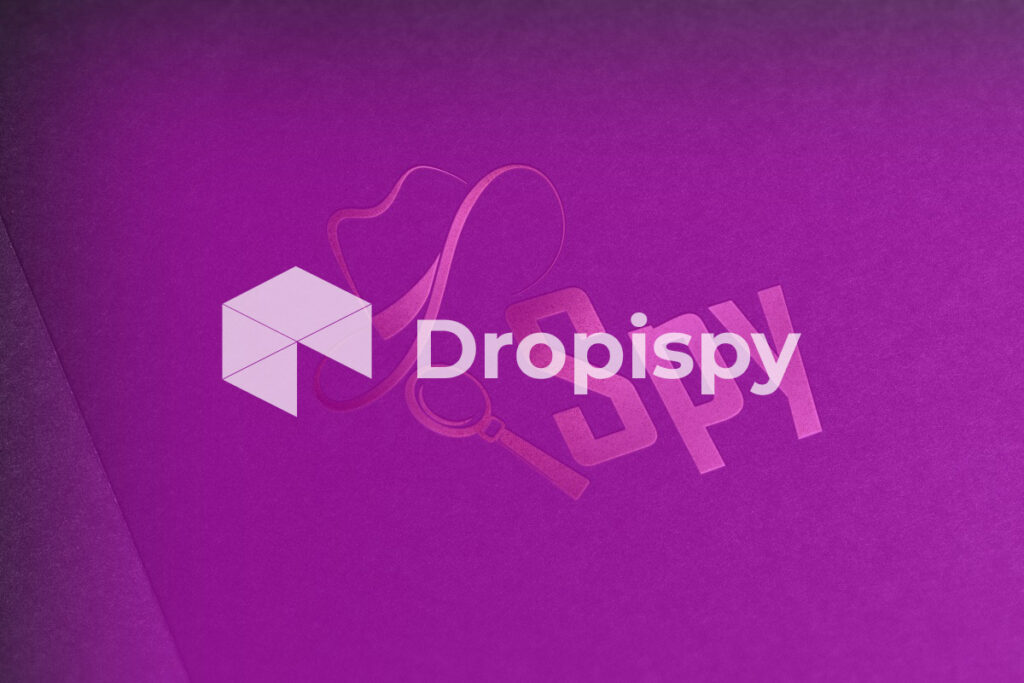
Whether it is new web entrepreneurs passing by dropshipping or large existing businesses changing their model business, e-commerce is an area that continues to grow each year. In 2021 alone, the figures collected in France exceed 129.1 billion euros.
In this article, you will find everything there is to know about e-commerce platforms. We share with you our top best e-commerce platforms, their features, their prices and their advantages.
An e-commerce platform is the set of technologies that manage all the parameters of an online sales business model. To better understand the concept, we can afford to compare an e-commerce platform to a real estate agency that offers locations for rent to traders. Traders are required to pay monthly or annual rent to retain their right of ownership.
The best e-commerce platforms still go far beyond simple hosting. It’s a whole ecosystem that allows you to manage and control the different aspects of your online sales business in one place.
Just like for physical stores, the better you invest in your e-commerce platform, the more you will be able to create a good experience of using your website for your customers.
As it was previously said, there are many ecommerce platforms. The best platform for you is the one that best matches your criteria and needs.
Here are 5 questions to ask yourself before choosing a platform among the top ecommerce platforms
It would be a mistake to believe that e-commerce only concerns B2C, B2B is also equally concerned. Although both are done online, their characteristics are very different and the needs are not the same. The best e-commerce platforms are those that best suit your specificities.
So, before you get started and choose your platform, it is essential to determine your type of business, because the features offered may not be suitable for you.
Pay attention to these points:
In B2C, it is generally the person who consults the site who buys the product. So the process is simple.
In B2B, purchasing decisions are made by consultation, they do not depend on a single person. The person put in contact with the store may not be the final decision maker. Naming it as the customer can generate errors in invoices and various internal processes.
Thus, it is important to identify all the representatives of a client company. To do this, an e-commerce platform must have the ability to manage a database including all this information.
A customer relationship management feature would then be necessary in the best platform for ecommerce websites.
If in B2C the customer buys in a single unit or in small quantities, in B2B the order of magnitude is completely turned upside down. We usually talk about wholesale when it comes to selling to companies.
Specific measures must be offered in the stock management modules of your software, you can also turn to wholesale ecommerce platforms.
The sale in B2B is done through negotiation, while in B2C there are fixed prices. Certainly, it is possible to offer discount codes in B2C, but the final purchase price offered in B2B is never the same for each company in the end.
An auction or haggling feature on your platform can be useful if you are in B2B.
If you want to operate mainly in B2B, take a look at our list of the best B2B e-commerce platforms.
E-commerce is an extremely vast market where anything and everything can be sold, whether it’s jewelry, electronic devices, clothing, books or services.
Online sales are not limited to physical products, you will also find electronic products, such as:
Some of these products require specific features on your e-commerce platform. If you are in infopreneurship for example, you will surely need, in addition to the basic functions of an e-commerce platform, tools for:
A large company with more than 50 employees will not have the same needs as a startup or a solopreneur who has just launched. We are mainly focusing here on the number of people who will have access to the platform.
In the case of a large commercial company, a department will be dedicated to managing the platform. So that there is no inconsistency in the various processes, a communication module integrated into the Saas would be welcome.
Smaller companies or solopreneurs may seek to delegate the customer relationship, limited access accounts will be necessary for them.
The majority of the best e-commerce platforms offer accounts with multiple member accesses, but not all of them are suitable for every business. For example, there are more optimized platforms for small businesses.
A platform full of tools and features is good software. However, this can make it very complex to use. If you have a history of using an e-commerce platform, getting started will be easy for you.
Otherwise, a less sophisticated platform with a drag and drop system, for example would suit you better.
The budget may not be a dead end for big companies, but for a young person who has just started, it can be penalizing. In both cases, be aware that there are online tools providing freemium offers or extended trial periods.
These allow e-merchants to get started and make their first Euros, once they need more features, they can always subscribe to a paid offer.
It is important to specify that due to the specificity of the use of certain tools, they cost more than others. So, establish a budget in advance to facilitate your choice and avoid cash flow problems.
Remember that the best e-commerce platforms are the ones that make you richer and help you grow, not the ones that make you poorer.
It is not easy to tick all the specificities of the points encountered above. Nevertheless, we have selected the best e-commerce platforms offering the best features for each e-merchant.
Discover here the top ecommerce platforms

Shopify is the best known and most used e-commerce platform with over 2 million active users. It is a Saas (Software as a service or software as a service) with a more than intuitive interface, which gives it an easy handling that does not require special knowledge.
Shopify offers pricing to suit all types of budgets and business sizes. Its ease of use combined with its accessibility makes it a popular tool for SMEs and solopreneurs. Shopify is, arguably, the best ecommerce platform for small businesses.
It is an online software suitable for multi-channel sales. It’s packed with features that make it easier to sell on your online store, social media, and everywhere else.
This e-commerce platform has for signature a plurality of ideal tools for the complete management of an online business based on e-commerce. Shopify offers among other features:

If Shopify is so popular, it is also due to its offers. It is one of those software that can bear the title of best ecommerce platform for small business.
To satisfy each type of business, Shopify offers 3 pricing plans:
In ascending price order, each formula provides more advanced features for managing your e-commerce. The first formula is more than enough to launch your online store, because it offers all the features necessary to manage it.
Shopify offers a free 3-day trial period to familiarize yourself with the software. It should be noted that the Basic offer normally at $24/month only costs $1/month during the first three months.
Thanks to the partnership between Minea and Shopify, you can even enjoy 90 Days of use for only €1.

Shopify is one of the best e-commerce platforms, if you want to know more, read our dedicated article.

If you already have a showcase site or a blog on Wordpress, installing the WooCommerce extension will allow you to transform it into a real online store.
WooCommerce being a complete CMS, it stands out thanks to its very wide customization capacity. However, it is not a “beginner friendly” software, customization, creation and handling requires coding knowledge. You can always hire a professional to set up your online store or opt for custom themes. blocks so you don’t have to code.
It is important to note that since it is a CMS, the purchase of a domain name, hosting and SSL certification is mandatory and is done independently of obtaining the extension.
If you want a hyper-personalized store that meets your needs, WooCommerce is surely the e-commerce platform for you.
WooCommerce works by theme and customization system. This means that each online store will have its own features. However, you are sure to have the following characteristics:
It is quite possible to create an online store with the pre-installed plugins, but for a smooth use and corresponding to your needs, we advise you to buy professional themes with a more intuitive interface.
WooCommerce is a free WordPress plugin. In its most basic and plugin-neutral version, it won’t cost you anything. However, for it to be functional, you must buy your domain name, your hosting and certain applications necessary for the proper functioning of your e-commerce platform.
Note that there are packs containing themes, extensions and a customizable arrangement of your website. These are easily installable, free and paid templates.
The costs of the templates vary enormously, as they can go from a few tens of euros to more than 3000 euros for a professional WooCommerce store.
If you want to know more about WooCommerce, we share more details in this WooCommerce review.

PrestaShop is a website editor known for its ease of use. Indeed, it does not require any knowledge of coding or programming to take it in hand. It is estimated that more than 250,000 successful online stores have been created on PrestaShop.
PrestaShop is therefore not limited to the creation of simple showcase sites or blogs, but to those of real e-commerce stores.
Just like WooCommerce, PrestaShop works by a system of templates and installable designs. This allows the e-commerce platform to provide over 300 features optimized for e-commerce.
With PrestaShop, you can, among other things:
When you arrive on PrestaShop, you have the option to download the software for free and start creating your store. You just have to follow the directions. Next, you need to add extensions that will allow you to manage the marketing, payments, sales, and analytics aspects of your future store.
PrestaShop provides you with the PrestaShop Essentials pack containing the modules provided for this purpose free of charge.
However, to take full advantage of PrestaShop’s capabilities, you will need to purchase paid themes and extensions. You can hire a freelancer or an agency to take care of the configuration and start-up of your online store.
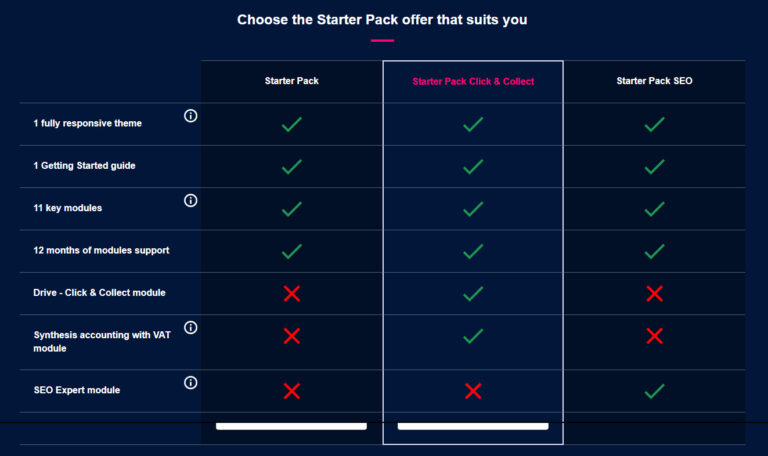
If you don’t know which theme to choose and which plugins to take, PrestaShop offers 3 Starter Pack offers:
For more information on PrestaShop, read this article.

BigBuy is an e-commerce provider and platform specializing in wholesale and dropshipping.
In these terms, BigBuy is not really an e-commerce platform on which merchant sites are created. The base platform, especially its business model on logistics, sending, supplies and product management you want to sell on your website.
Nevertheless, BigBuy offers a turnkey solution of an e-commerce store directly synchronized with suppliers.
The shops offered by BigBuy are created from Shopify.
Since BigBuy’s turnkey stores are templates made from Shopify stores, these have the same functionality as those you create yourself.
You will therefore find as characteristics:
BigBuy offers shops with pre-proposed themes such as:
All these boutique models are offered at the same price of 790 €.
NB: BigBuy is also available as an extension on platforms such as WooCommerce, PrestaShop or Magento.

Wix is a website builder specializing in e-commerce. It is a very easy to use SaaS with a hyper intuitive interface. Like the previous platforms presented, Wix offers hundreds of ready-to-use templates dedicated to any niche or industry.
You can modify and configure them without any difficulty.
When customizing different pages and different texts, the use of drag and drop (drag and drop) allows any beginner to improve the design of their site without having to write a single line of code.
Although Wix can accommodate an infinite number of products, the platform performs best in stores with a smaller number.
Wix is a very complete platform that offers the following features:
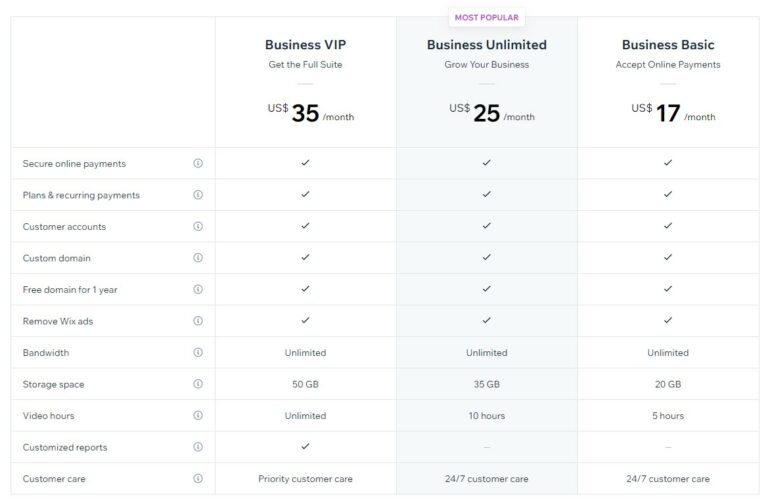
For creating an online store, Wix offers three premium “business and e-commerce” plans.
If you didn’t like the Wix Premium plan, you can cancel the purchase within 14 days and receive a full refund without conditions.

Belonging to Adobe, Magento is an open source or free ecommerce platform aimed at companies involved in wholesale (products and large catalogs). It therefore corresponds to businesses focused on B2B.
Like any software intended for more advanced use, it is a particularly powerful platform, but it is expensive and difficult to learn, so it is not suitable for beginners.
Adobe Commerce has the particularity of not being limited to a single store, so you can manage several stores at the same time.
To meet the needs of its customers, Magento has the following main features:
Magento Adobe Commerce is available for $0 per month per user. It is an Open Source software which, as its name suggests, is free to use. However, this rate can vary widely due to the different options and additional tools to which the customer will have to subscribe. There is therefore no fixed price, but you can request a quote from the Adobe Commerce site.

Squarespace is an e-commerce platform focused on personal branding and niche stores. It is a platform suitable for more personal communication with an e-shop offering fewer catalogs and products than those of large firms.
Easy to learn, it is intended for beginners or people with no prior knowledge of programming.
In a more down-to-earth perspective with its customers, the platform allows multi-channel sales through the various social networks.
Here are some of the features and functionality of Squarespace:

For annual pricing, Squarespace offers 4 pricing plans:
Squarespace is not a free ecommerce platform. But in order to fully test their platform, Squarespace offers a 14-day free trial period. No bank card is necessary.

An exemplary ease of handling, a clear and fluid interface, a few clicks to configure it. Ecwid is an e-commerce platform used by more than one million users in nearly 175 countries.
It not only allows you to create an online store from A to Z, but also to transform an already existing site into an e-shop thanks to its extensions.
It is another e-commerce software more than suitable for multi-channel sales. It easily integrates with any web support as well as with different points of sale. The platform can be fully managed from its mobile application.
Ecwid being a platform dedicated to sales provides several features in this direction:
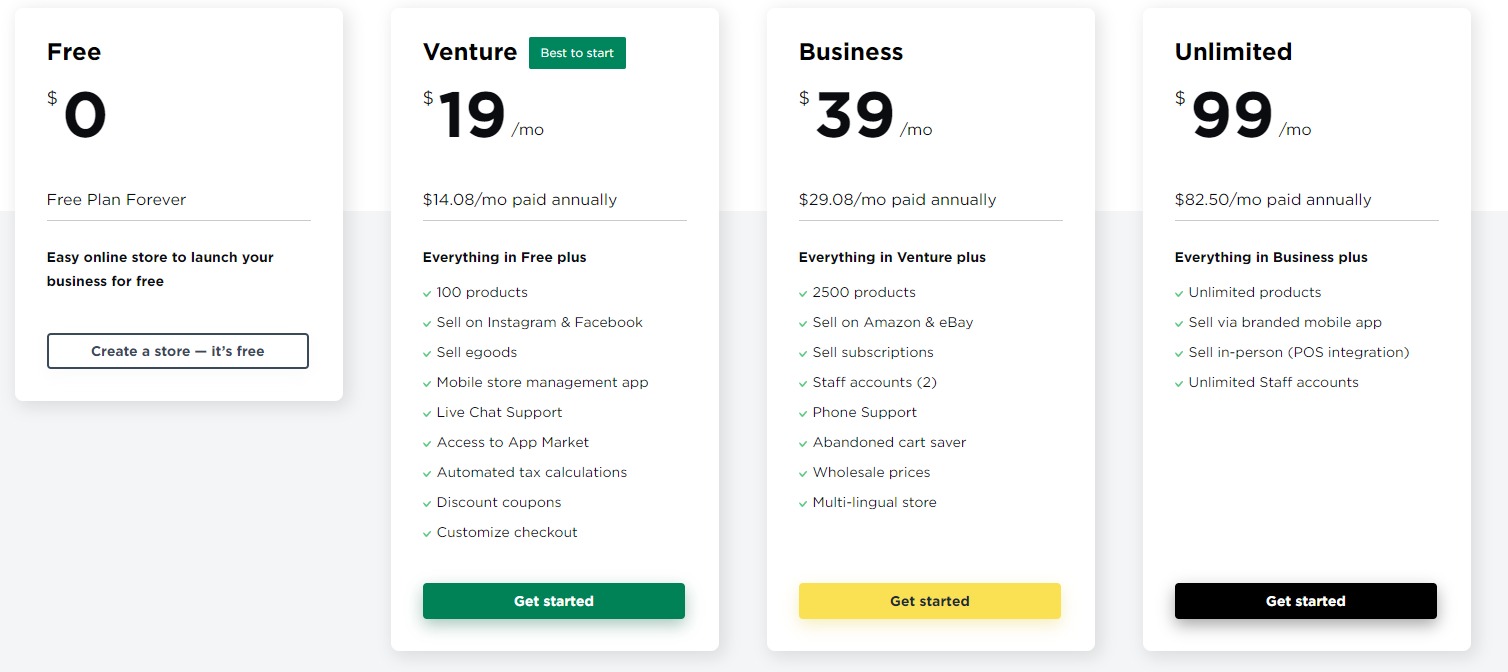
To meet the demands of its customers, Ecwid offers 4 offers:
The point to remember with Ecwid is that it offers a freemium offer allowing you to create a real online store completely free of charge. The shop only allows you to sell about ten products, but that’s more than enough to get started. You can always upgrade to a paid pricing plan once you need more features.

Systeme.io is an all-in-one marketing tool dedicated to people wishing to launch their business online. The software offers an e-commerce platform, but is not limited to this aspect.
Indeed, systeme.io offers various tools dealing with all aspects of an online business. All this including tools for communication, marketing, sales management, customer relationship management and many more.
It is a user-friendly platform offering an easy-to-access interface and a simplified handling. This is an excellent compromise for all new web entrepreneurs who do not have real knowledge of coding and programming.
Being an all-in-one software, systeme.io has many features such as:

Systeme.io has 3 pricing plans:
Systeme.io allows its new users to launch their business for free thanks to its free offer. This offer has no expiry date, its only downside is the limit of the number of sales pages and products that you can market.

Weebly is an e-commerce store editor known for its simplicity and ease of use. It is owned by the same company as Square, however, the two e-commerce platforms offer different offers.
It offers a free plan with unlimited products although it is more suitable for small e-merchants.
Weebly is therefore an extremely affordable solution for all small businesses wanting to get started on the web. Even its premium rates cost significantly less than those of its direct competitors.
Weebly is a best e-commerce and digital marketing platform, you can find some of its main features and functions below:
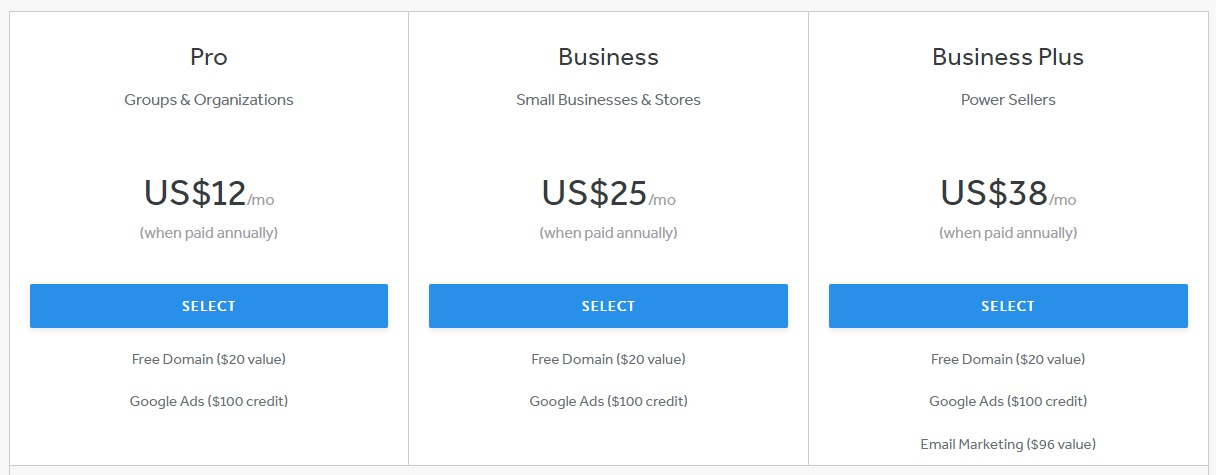
To take advantage of Weebly’s ecommerce features, you will need to subscribe to one of Weebly’s 3 paid offers:
It is important to note that Weebly offers a free offer, but it only concerns the creation of a showcase website on which you cannot sell directly online.
| Software | General note | Prices | Free Trial | Free Plan | Integrations | Drag and Drop | Hosting |
|---|---|---|---|---|---|---|---|
| Shopify | 4,3/5 | From €24/month | ✔️ | ❌ | ✔️ | ✔️ | ✔️ |
| Woocommerce | 4/5 | From €0/month | ✔️ | ✔️ | ✔️ | ✔️ | ❌ |
| PrestaShop | 4/5 | From €169.9 excl. VAT then €120/year | ✔️ | ✔️ | ✔️ | ✔️ | ❌ |
| BigBuy | 3/5 | 790 € then depending on Shopify | ❌ | ❌ | ✔️ | ✔️ | ✔️ |
| Wix | 4,3/5 | From $35/month | ✔️ | ❌ | ✔️ | ✔️ | ✔️ |
| Magento | 3,5/5 | From €0/month | ✔️ | ✔️ | ✔️ | ✔️ | ❌ |
| Squarespace | 3,5/5 | From €11/month | ✔️ | ❌ | ✔️ | ✔️ | ✔️ |
| Ecwid | 4,4/5 | From €0/month | ✔️ | ✔️ | ✔️ | ✔️ | ✔️ |
| Systeme.io | 3.9/5 | From $0/month | ✔️ | ✔️ | ✔️ | ✔️ | ✔️ |
| Weebly | 4,3/5 | From 12 /month | ✔️ | - | ✔️ | ✔️ | ✔️ |
There are many ecommerce platforms on the market. The choice of the latter must take into account all the criteria concerning your business, your objectives and your means.
In general, the best ecommerce platforms remain very open to beginners in order to reach a large number of potential prospects. However, take the time to compare each software to see which one suits you best.
Although the best ecommerce platform for small business and beginners should provide lower rates. It is important to specify that a free ecommerce platform is never completely free, at best it will offer you a free tariff plan with limited functionalities.
However, we have presented to you, according to our experience and our analyses, the best ecommerce platforms likely to carry out your e-commerce project without having to destroy your wallet.
If you want to start e-commerce, but you don’t know what to sell, take a look at Dropispy. It is an online tool that allows you to find the latest trending products as well as the accompanying advertising strategies.
The best e-commerce platform is the one that best meets your needs and expectations. Make a list of the points you want to see in an e-commerce platform as well as the goals you want to achieve. This will help you in your final choice.
Shopify is one of the best current platforms, because its handling does not require any prior knowledge.
Platforms providing a free trial period or offering a completely free plan are favorite platforms for new entrepreneurs. These offers allow them to invest in other important points of their business without having to worry about the costs of the website. However, €1/month offers like those from Shopify, which include all the features needed to manage an online store, are an excellent choice.
E-commerce is the contraction of the two words “commerce” and “electronic”, moreover, it is also known as “electronic commerce” or “online commerce”.
In short, e-commerce refers to all commercial transactions carried out remotely on the Internet. This is a very strong growth sector that has transformed consumer buying habits over the past 10 years.
Electronic, because all processes are done online, the entire sales funnel from communication to customer conversion.
E-commerce solves the geographic and time problems imposed by traditional commerce, since it is done through all terminals that can navigate the Internet.
Dropshipping in its current state is the most popular e-commerce strategy for startups and new web entrepreneurs. This is due to its much simpler and easier to set up process than that of traditional online stores.
Its origin is not found online, but the internet has facilitated its processes and evolution. Dropshipping does not require stock management, the e-merchant essentially takes care of the marketing and sales phase of the product(s) to be sold. In effect :
Everything concerning the production, logistics, packaging and shipment of the product is provided by the supplier. The dropshipper therefore plays a kind of intermediary role between the supplier and the target clientele.
It is a very advantageous online business, because it does not require any initial costs.

